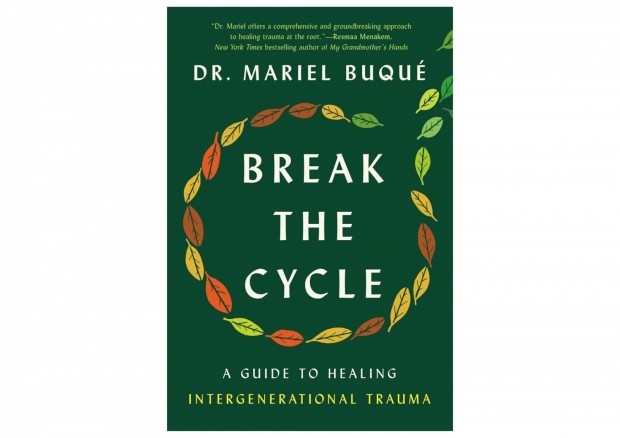Dr. Mariel Buqué’s New Book Explores the Long-Term Impact of Trauma and Strategies for Healing

Unlock the secrets of healing intergenerational trauma with Dr. Mariel Buqué's transformative book, "Break the Cycle: A Guide to Healing Intergenerational Trauma." (Photo : Amazon/Dr. Mariel Buqué)
Dr. Mariel Buqué, an expert in intergenerational trauma and a Columbia University-trained psychologist, delves into the profound nature of trauma's influence across generations. Her transformative book, "Break The Cycle: A Guide to Healing Intergenerational Trauma," shows us how to turn pain into strength.
Dr. Buqué uses science, simple exercises, and stories to show how not healing emotional wounds can affect our lives, families, friends, and communities.
Intergenerational Trauma and Higher Self
In a recent episode of "Closer Look," Dr. Buqué shed light on her insights shared in the newly released book. Dr. Buqué draws attention to the idea that trauma is not confined to individual experiences but can stretch across family lines and impact entire communities. These effects persist through generations, creating complex emotional and psychological challenges.
Dr. Buque suggested that trauma can be inherited, appear in our genetic codings, and be passed on to new generations. This inherited trauma can make one engage in self-abusive activities or even suppress their emotions so as not to feel difficulty.
Dr. Buqué also tapped into the concept of the higher self. According to her, the higher self is the wisest part of our mind or the version of ourselves, holding a lot of wisdom. Throughout generations, wisdom and qualities can be handed down in families and communities. This inherited wisdom can help one escape difficult circumstances.
In healing, Dr. Buqué suggested tapping into the intergenerational higher self and looking at the pre-existing pattern that happens within the family. This self-awareness can allow individuals to avoid passing this pattern to the new generations and be able to break the cycle.
Writing Process and Personal Experiences
In writing the book, Dr. Buqué had drawn inspiration from working with clients as a psychologist. She shared that the actual writing took only a month. However, data collection took her almost a decade. Dr. Buqué also made use of research and scientific writings.
READ ALSO: Jean Twenge's New Book Dives Into the Differences Between Generations
Dr. Buqué tried to be inclusive in writing the book. She used her mother as an example to introduce the concept of internal change. In her early years, Dr. Buqué felt tense with her mother's habit of retaining items to hold onto guilt. Dr. Buqué shared that now she feels calm about her mother's habit, showcasing how internal change can affect the body's response to various situations.
Studies on novel cellular memory are still scarce. One study suggests that cellular memory can span seven generations, according to Dr. Buqué. With this information, many traits and wisdom can be traced from older generations to understand the generations of today.
Mental Health Journey and Healing Strategies
Before becoming a mental health professional, Dr. Buqué worked in advertising but felt unfulfilled. Volunteering in mental health introduced her to the career, and her own therapy journey led her to pursue it professionally.
Dr. Buqué focused on a holistic approach to healing, giving importance to somatics, and considered the body's role in the healing process, understanding that trauma goes beyond just talking about it and can affect our bodies.
She recommended three simple practices as starting points to connect with the body: deep breathing, rocking, and humming. According to Dr. Buqué, these exercises have immediate soothing effects on the nervous system and contribute to long-term healing. By incorporating these practices, she aims to connect the mind and body for a more comprehensive healing experience.
Dr. Buqué hosts the "Break the Cycle" podcast, finding fulfillment in helping others heal. Her focus is on educating her community about trauma cycles, especially those with limited access to healing tools. Coming from a rural, impoverished background, she aims to increase access to these tools.
RELATED ARTICLE: 5 Positive Psychology Books to Make 2024 Your Best Year Yet
© 2023 Books & Review All rights reserved.
Popular Now
1
Books to Read After 'Fourth Wing': Top Picks for Fantasy and Romantasy Fans

2
‘The Secret Public’ by Jon Savage Book Review: An Insightful Look Into the LGBTQ Influence

3
Stephanie Regalado's 'If They Only Knew' Column Is Now A Book, Unleashing 60 Anonymous True Stories to Empower Women

4
'No Wire Hangers' Scene That Almost Did Not Happen: New Book Reveals Faye Dunaway's Struggles

5
Rare First Edition of Aphra Behn's Novel 'Oroonoko' Discovered in Kent: A Historic Literary Find

Latest Stories
Book Reviews
‘The Secret Public’ by Jon Savage Book Review: An Insightful Look Into the LGBTQ Influence

Book News
Stephanie Regalado's 'If They Only Knew' Column Is Now A Book, Unleashing 60 Anonymous True Stories to Empower Women

Book News
'No Wire Hangers' Scene That Almost Did Not Happen: New Book Reveals Faye Dunaway's Struggles

Book Reviews
‘The Perfect Couple’ by Elin Hilderbrand Book Review: A Captivating Summer Mystery

Book News
New Book ‘The Franchise’ Reveals Penguins President Kyle Dubas’ ‘Biggest Mistake’ as Maple Leafs GM










